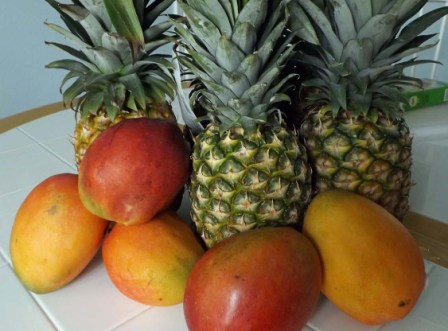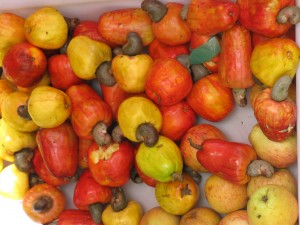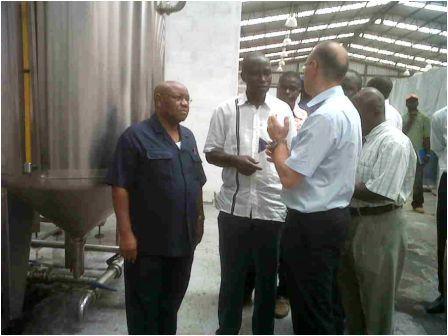Mangoes and Pineapples – A Place Where Sierra Leone Youth Jobs Are
The greatest problem facing the post-conflict nation of Sierra Leone are the bloated expectations of the teeming unemployed, under-employed, misemployed …youth. The “youth” between 15 to 35 years of age comprise about 35% of Sierra Leone’s 6 million population. The audacity of our youth to grab at all cost the fine life they drool over when watching American musical videos (with lyrics of US musical idol, 50 Cents, “Get rich now or die trying” stronger in their consciousness than verses in the Bible or Quran – Hummer jeeps and Mercedes cars; marble mansions; designer dresses, etc.) when juxtaposed with the youth’s lack of capacity to achieve their dreams is a frightening sociological and political concoction.
As the youth add years to their biological agesand their dreams evaporate as fantasies, there is dangerously brewing frustration, disillusionment – and, some local musicians have started pouring fuel to the youth’s mental fires with ‘Blame Game’ Songs that ar a trifle incendiary; politicians opposed to the governing APC government are gleeful, marketing themselves as near Messiahs, pouring tanker load of fuel to cinders of perplexity of the youth, hoping for a political conflagration that would result in their wrestling the reins of power from the APC government.
The governing APC government is overly conscious of the centrifugal forces which the youth represent – and have set up, for the first time in our country’s history, a separate youth ministry, to better guide a National Youth Commission the government had established. The President, H.E. Ernest Bai Koroma, has avowed that youth – who go berserk in excitement at his presence, and dubbed him “World Best” last year – are his ‘Number One Priority’. Time is racing against the President and the governing APC – as the ‘Youth Anger Fuse’ has been lit and sizzling towards a bomb. There has to be a paradigm shift in the way we address the youth problem; and, the best and brightest and most patriotic among the educated elite of the citizenry (on all continents) – taking cues from Special Adviser to the President, world famous ‘rice scientist’, Dr. Monty Jones, in his “National Dialogue” thrust – should bond together. One potent solution could be in mobilizing youth to grow and collect…Mangoes!! Pineapples!!
World Hope…trains farmers; Felix Juice buys their mangoes/pineapples
The FIRST STEP organization is operating a Special Economic Zone (SEZ) in Newton, on the Freetown peninsular. Their first client is the Felix Juice Factory. They are buying pineapples and mangoes from local farmers to make concentrates which are exported to Europe. It is a pacesetting blend between developmental thrust and commercialism.
Last year alone, the Felix Juice Factory bought 680 tons of mangoes from about 2,500 farmers in Tonkolili, Bombali and Kenema. They have organized farmers into 157 Committees in 12 chiefdoms. We all know that during the ‘Mango Season’ in Sierra Leone – between April and July – most of mangoes that grow everywhere in the country would be overeaten by children, a few sold, and most left to rot, and swept away as garbage. This is where the FIRST STEP experiment comes in…..
The non-profit non-governmental organization, World Hope International (WHI), with its headquarters in Freetown, is giving farmers technical knowledge and training in handling the mangoes. The farmers are taught the type of mangoes the Felix Juice Factory would buy – not too ripe ones; and, not too green ones either. Mangoes with no spots or stripes on them are wanted. Mango trees are generally huge trees. Traditionally, people would just go up a mango tree and shake a tree and there would be an avalanche of mangoes on the ground – whooping delighted children would then grab the best that would catch their eyes. Not so for commercial mangoes. The farmers are taught to shake trees – but, to have tarpaulin underneath a tree, or, thick bed of rice husks, to give the mangoes a safe landing. And, keep them from being damaged. The farmers are also taught how to sort and grade the mangoes. Once the mangoes are collected in villages, the World Hope International arranges for transportation – free of cost to the farmers – to the factory, where the Felix Juice buys them..
World Hope International is also teaching farmers how to start mango farms. The species preferred are the ‘Njala 5’ and ‘Cepton’. Mangoes take three to five years to reach maturity when planted. Mango trees have a long life – between 20 years to 80 years, depending on the species. The yellowish/greenish small oval mangoes known in local parlance as “common mango” or “rope rope” is not much loved for local consumption, but, the Operations Manager of FIRST STEP, Steven Grudda, told me it is the best type for the Felix Juice. Giving local farmers agronomical lessons, and bookkeeping and business management lessons; providing farmers with farm implements, and fertilizers is part of WHI gratis service in the mango business.
Pineapples are harvested during the ‘Hunger Season’ in Sierra Leone
Once the ‘Mango Season’ is over, the Felix Juice Factory turns attention to pineapples. For now, most of the pineapples suckers are procured from private and public companies in Guinea. Pineapples are tough. They can grow almost anywhere – even where there is little or no rainfall. Through the training of WHI, the farmers who used to have pineapple crop yield of 5,000 tonnes per acre now grow an average of 30,000 tonnes per acre.
As Steve Grudda told me when I visited an experimental pineapple farm close to the Felix Juice Factory two weeks ago, the pineapple peeling is being used as fertilizer – and, soon, will be used as biomass to generate electricity.
Why should Sierra Leoneans get excited about the still infant mango and pineapple export industry being nurtured by FIRST STEP?
Rising Global Demand for Mangoes and Pineapples
Modern science, and the capacity of the internet to popularize scientific findings all over the globe, daily churns out glamorous reports on the health benefits of eating vegetables like tomatoes, and fruits like mangoes, pineapples, bananas, etc. Hundreds of millions of people in the rich developed countries are now getting into this health act of eating fruits and vegetables. Including the rich nutrient, mineral and vitamin content of fruits like mangoes and pineapples, fruits are known to lower blood pressure, reduce risk of heart disease, stroke, and probably some cancers; and help to lower the risk of eye and digestive problems. Mangoes also have medicinal uses. Mangoes can also serve as laxative sometimes. The ripe fruit has fattening, diuretic and laxative properties. It helps to increase digestive capacity.
Also, the spiked demand for fruits like mangoes and pineapples is driven partly by a rising preference by customers in the richest countries in the world for healthy drinks (like mango and pineapple fruit juices) over soft drinks (like Coke and Pepsi). There is also a rising demand for organic, super fruit and 100 percent natural fruit juices – without any sweeteners (like powdered Forster Clark sold in our stores here). This means that in the very near future, producers will require more raw fruits to make a glass of juice.
Countries like Ghana, South Africa, Ivory Coast and Kenya earn millions of dollars every year from fruit exports to Europe and USA – because tropical fruits like mangoes and pineapples are seen in the richest countries on earth as not being faddish, but, health givers and lifesavers;
Pineapples contribute to over 20 % of the world production of tropical fruits and as a crop are second only to bananas as the most important harvested fruit. Mangoes top both fruits in demand in the richest countries on earth.
FIRST STEP as sociological and political stabilizer in Salone
FIRST STEP’s client, Felix Juice Factory, is, potentially, a sociological and political stabilizer, and economic propellant, for Sierra Leone. Collecting and growing mangoes and pineapples is a labour intensive industry. These tasks include land preparation, planting, fertilizing, pesticide spraying, harvesting and packing. Thousands of our unemployed youth – even those idling away their time watching and talking fanatically about European Football – can be employed in Felix Juice Factory’s budding mango and pineapple agro-industry – which can be transformed into a mega industry. If!!!!…. If politicians sheathe their ethnic/regional swords; if religious leaders live up their ‘holistic creeds; if civil society leaders see their roles as stimulants for development and not just critics; if traditional leaders flex their muscles to instil work ethic into youth; if youth leaders get inspirational and end suicidal laziness in youths; if musicians and film stars glamorize mangoes and pineapples….and bond together to help ‘reconfigure’ the thought patterns of youth away from their perception of jobs being only within offices, away from indolence in cities….. to one of hard work. One thing Sierra Leoneans, especially youth, must be inculcated with is this: all peoples all over the world are ALWAYS in a global competition. Even in growing and marketing of pineapples and mangoes.
There is global competition in all spheres
The major growers and marketers of mango are in Asia. Mangoes have been cultivated in Asia for 6,000 years. India ranks first among world’s mango producing countries accounting for about 50% of the world’s mango production. Other major mango producing countries include China, Thailand, Mexico, Pakistan, Philippines, Indonesia, Brazil, Nigeria and Egypt. Even in Ivory Coast, the land area where pineapples are grown could be as large as half of the Southern Province in Sierra Leone. These countries are not going to just allow Sierra Leone to carve out a market away from them. When we stimulate our youth to be more competitive and productive, we can begin to give meaning to ECOWAS and Mano River Union protocols for increased regional trade – exporting Sierra Leone’s mango and pineapple products to huge markets like Nigeria, where they still drink ‘an ocean’ of unhealthy carbonated Coke and Pepsi drinks. The audacious expectation of our youth can then be made concrete through such mango and pineapple agro-industries.
Oswald Hanciles
Stay with Sierra Express Media, for your trusted place in news!
© 2013, https:. All rights reserved.





